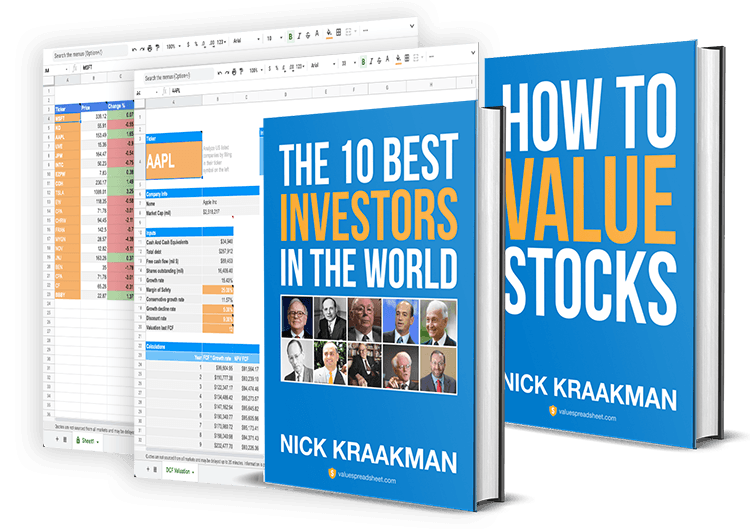Transcript
Hello, welcome to episode 3 already of the value investing boot camp podcast.
I'm your host, Nick Kraakman, and today we have a lot to cover, so we'll dive straight in!
The topic for today's podcast episode will be different kinds of ways to behave on the stock market, so to say.
I mean, you have investors on one hand, and speculators on the other hand, and there is an important distinction between the two.
First of all, the most important distinction, is that they have different time frames.
Where speculators try to earn money on a per second basis, investors actually have a longer time horizon, and this creates a totally different way to look at stocks.
I mean, to predict short term price movements, we already or I already told you in one of the earlier episodes, it's simply impossible, because price movements are dictated by irrational behavior caused by emotions of fear and greed, and all kinds of weird stuff that goes on in your mind, especially when it comes to money people just behave in unpredictable irrational ways.
Therefore, it is impossible to predict stock prices in the short run, yet speculators try to do this.
They sometimes use techniques called technical analysis, which is simply taking historical price movements, so a stock chart, for example, and then drawing some lines on it, and they say like, oh, yeah, so the price movement of yesterday was so and so, so tomorrow, it will be this and this.
This is not possible.
I mean, it makes no sense.
Of course, humans see patterns in everything, that's just how our brains are hard wired, but Warren Buffett once said about technical analysis that he immediately knew it wouldn't work when he turned the chart upside down and got the same result.
So, technical analysis, trying to predict prices, is what speculators usually do, they try to make money in the short run, and it's more based on luck rather than actual knowledge.
Because just take, for example, the Forbes 500 list.
This is the list of richest people in the world.
There's not a single technical analyst in that list, however, there are several value investors in that list like Warren Buffett and George Soros, so that just goes to prove that in the long run, I mean, even if these technical analysts sometimes make massive profits in an incredibly short period of time, they can lose it just as quickly.
They sometimes say slow and steady wins the race, and that's definitely the case on the stock markets, because value investors actually use time to their advantage.
They let their profits build up, they compound so to say.
So, let's say you have $1,000 invested and you earn 10% profit, that means that the next year you have $1,100.
You have the $,1000, the initial $1,000 and $100 profit.
But the next year thereafter, if you earn 10%, again, you don't earn the 10% over the $1,000 you invested at the beginning, but you earn it over the $1,100 that you have now.
So, that means that it builds up, and it goes quicker than you can imagine.
I mean, Albert Einstein actually called this compound interest, this compound growth, the Eighth Wonder of the World.
Coming from his mouth, this should mean something.
This is a really powerful tool for value investors; time is your friends on the stock market.
Another major distinction between speculators and investors is that speculators don't really care whether they sell stocks or buy stocks of great companies like value investors do.
Value investors really look for great companies with high profitability, low debt levels, which are just very strong companies, while speculators don't really care.
They only care if someone is willing to pay a higher price for it so they can make a little profit.
They're just hustling so to say.
This can work in the short run, but it's sometimes called the greater fool theory.
So, they are the fool for buying this crappy company, but they hope there is an even bigger fool willing to pay even more money for that same stock.
And that's just a strategy that might work sometimes when you're lucky, but in the long run, this will fail miserably, of course.
Value investors go for quality, and quality always wins out in the end.
Another difference is that value investors focus on absolute returns, where speculators sometimes compare themselves with a benchmark to show relative returns.
The only problem with that is that relative returns, you can't spend them you can't spend relative returns if you do better than the stock markets.
So, for example, the stock markets, the S&P 500 lost 10% of its value in any given year, and you only lost 5%.
Well, that's, you could say, oh, well, that my relative performance, I performed relatively better than the stock market because I lost less money, but in the end, you still lost money!
In absolute returns, you lost money.
Value investors only care about what they actually earn and they don't worry about what everyone else is doing, just focus on their own results.
Because of what we've earlier said, that prices move in unpredictable ways, it sometimes happens that value investors underperform the stock market for a very long time.
So, their relative performance can be pretty horrible in the short run, but in the end, they make that up because they bought stocks at such low prices that the returns, once prices revert back to the actual value of the company, the returns are amazing.
For example, let me tell you something from my own experience.
I once owned a company called Universal Insurance Holdings.
At that point, it was trading at a price below the net cash that it had on its balance sheet.
So, even if the company would go bankrupt that same day, I would still make money money, because of all the cash that it had.
So it just made no sense for that stock to trade at that price.
So, I purchased it and then it underperformed for about three years in a row.
It had horrible results, I mean, stock price declined even further and it was just terrible.
While all the stocks were going up, my stock was going down.
However, I still believed in my investment thesis that it was correct, so I stuck to it and after about three years, it started shooting up like crazy, and it got me a return of about 170% which, if you spread it out over three years, is still a very impressive return.
So, even though I underperformed for three years, in the end, I outperform the market handsomely.
That just goes to show that short term price movements are unpredictable and it would just be speculation, pure gambling if you try to predict them.
Investing for the long term based on the quality of a company is the only way to consistently earn above average returns while taking lower risks.
I just want to explain that this podcast is pure improvisation; I just pick a topic and start rambling.
The video course is much more to the point and is really jam packed with information.
Every sentence that is in there is chosen deliberately to convey a certain message, which I believe is important for you guys to know.
So, I really believe it will give you a lot of value, and besides all the video content, there will also be a free ebook, several spreadsheets, checklists, you name it.
If you have any questions for me, you can send me an email at
Thanks again for listening, and in the next episode we'll talk about setting realistic goals and setting yourself up for success really.
I'll see you then!
If you enjoyed today's show, head over to ValueInvestingBootcamp.com to find out more on how you can invest like the pros, manage your own portfolio with confidence, and consistently earn mind boggling returns on the stock market.



